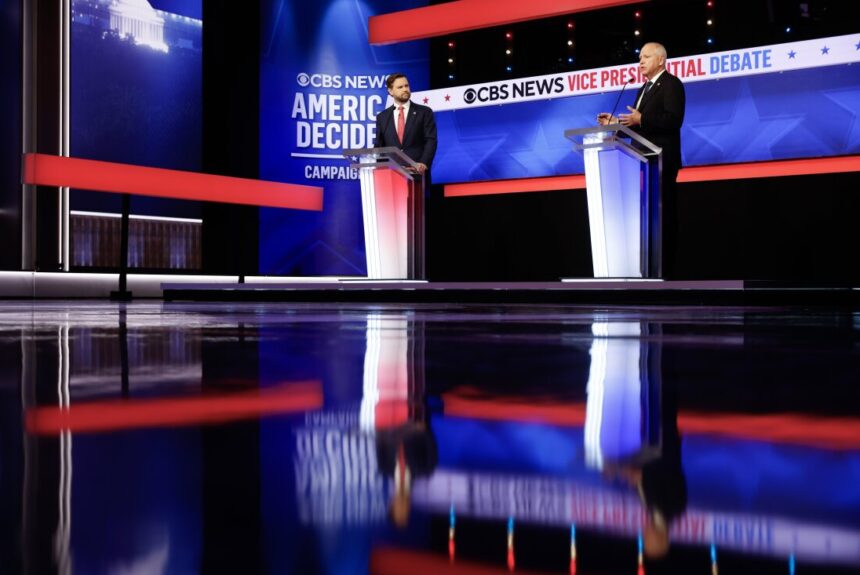The most important comment on climate and energy policy in the surprisingly substantive Vice-Presidential debate didn’t come from either U.S. Senator JD Vance or Governor Tim Walz but from CBS News moderator, Norah O’Donnell.
At the end of an extended and thoughtful exchange, O’Donnell felt compelled to get the last word and essentially shouted, “But the science is settled!”
O’Donnell specifically said, “Governor [Walz], your time is up. The overwhelming consensus among scientists is that the earth’s climate is warming at an unprecedented rate. Margaret?”
If a viewer tuned in late and only heard O’Donnell’s comment, they would reasonably conclude Vance and Walz had just been debating climate science. But that wasn’t the case. They weren’t fighting about “the science.” Vance and Walz had just offered different visions and policies about how to best reduce emissions and promote economic growth.
>>>READ: Harris-Walz Have a Big Fracking Problem
O’Donnell’s comment offered no useful context other than to illustrate the divide between the left and right on climate and energy policy and how we talk past each other. Progressives tend to measure “seriousness” by the earnestness with which someone bends the knee to “the science” while conservatives say it’s more important to consider how energy policies affect emissions and economic growth. In other words, from the conservative perspective, it doesn’t matter how many emissions targets you set if your policies aren’t capable of hitting targets. Virtuous (i.e. sound) policy matters a lot more than virtue signaling.
On substance, Vance offered the most thoughtful and comprehensive conservative statement on climate policy since the first presidential debate when Nikki Haley outperformed Vivek Ramaswamy’s too-clever half response. Haley said climate change is real and that getting serious about emissions requires holding the biggest global emitter, China, responsible while Ramaswamy said “the climate change agenda is a hoax.” Viewers gave Haley’s response far higher marks.
Vance seemed to have taken note and built on Haley’s answer. He said:
Norah, you asked about climate change. I think this is a very important issue. Look, a lot of people are justifiably worried about all these crazy weather patterns. I think it’s important for us, first of all, to say Donald Trump and I support clean air, clean water. We want the environment to be cleaner and safer, but one of the things that I’ve noticed some of our democratic friends talking a lot about is a concern about carbon emissions. This idea that carbon emissions drives all the climate change. Well, let’s just say that’s true, just for the sake of argument … [W]hat would you want to do? The answer is that you’d want to reshore as much American manufacturing as possible and you’d want to produce as much energy as possible in the United States of America because we’re the cleanest economy in the entire world. What have Kamala Harris’s policies actually led to? More energy production in China, more manufacturing overseas, more doing business in some of the dirtiest parts of the entire world. When I say that, I mean the amount of carbon emissions they’re doing per unit of economic output. So if we actually care about getting cleaner air and cleaner water, the best thing to do is to double down and invest in American workers and the American people. And unfortunately, Kamala Harris has done exactly the opposite.
In Walz’s response, he attempted to shift the focus to Trump’s claim that “climate change is a hoax.” Trump, in fact, has been all over the map on climate rhetoric. He has said both, “I don’t think it’s a hoax” and “It’s a hoax.”
But Walz also moved to the right in his answer and argued that Harris supports an “all of the above” energy strategy.
Not surprisingly, Vance didn’t scold his running mate for his lack of message discipline and instead emphasized the Trump-Vance approach to climate and energy policy. Vance concluded that Biden-Harris’ policies have not only raised energy prices but have “also meant that we’re doing worse by the climate.”
>>>READ: Energy Policies a Potential Trump-Vance Administration Should Prioritize
On rhetoric Vance is right. Free economies are twice as clean as less free economies. As George Mason economist Donald Boudreaux says, we’re “cleansed by capitalism.” If there is a Trump-Vance administration, their policies need to reflect that. That means embracing innovation, competition, and free trade. It means modernizing outdated regulations that stifle energy investment and deployment. And it means working with Congress to pass a substantive, comprehensive permitting bill that will increase energy supplies to meet America’s growing energy needs. Our Climate & Freedom Agenda lays out the legislative playbook for human flourishing, energy security, and environmental progress.
It’s hard to say whether the Vice-Presidential debate, which Vance clearly won, moved the needle. But it’s clear that viewers appreciated a thoughtful policy debate that came through in spite of the moderators.
The views and opinions expressed are those of the author’s and do not necessarily reflect the official policy or position of C3.
